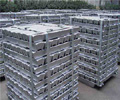

China will continue to release metals stocks from its reserves in batches in the upcoming months in a bid to alleviate pressure on downstream processors and fabricators, the National Development and Reform Commission said in a press conference July 19.
China’s domestic aluminum prices have been on the rise in recent weeks, as major smelters curbed output in the face of power supply shortages, propping up material prices that posed challenges to end-users.
In the first batch, China released metals stocks, including 200,000 mt of copper, 500,000 mt of aluminum and 300,000 mt of zinc. The stock release was arranged through an open-bidding process on July 5.
NDRC said that the stock release reached a preliminary target that called for stabilizing of market prices. It also helped downstream users replenish their inventories at lower costs.
More than 200 nonferrous metals processors participated in the open bidding and the transaction price was 3%-9% lower than the intraday market price, according to sources.
Volatile prices
China’s domestic aluminum prices came under pressure July 19, taking the cue from the latest NDRC statement, and amid market chatters that 100,000 mt of aluminum ingot will be released during the second batch.
The most-active aluminum contract for September delivery on the Shanghai Futures Exchange, or SHFE, closed at Yuan 19,275/mt ($2,972/mt) on July 19, down Yuan 195/mt, or 1%, from the previous close.
The contract has been hovering at a key resistance level of Yuan 19,000/mt since July 9, staying firm due to tight market situation.
Market sources expect domestic aluminum prices to remain volatile at elevated levels in the near term. However, further price rise could be limited due to the upcoming slow seasonal demand, they added.
Tight supply
Smelters in Yunnan province may postpone their plans to resume production from mid- or late-July, sources said. New projects are also expected to run into hurdles due to electricity shortages in the summer season.
Primary aluminum smelters in Yunnan have shut down nearly 900,000 mt/year capacity due to power supply shortages and are yet to resume production, sources said.
Meanwhile, smelters in Inner Mongolia were maintaining their output curbs as part of their plans to meet energy consumption targets. Some primary aluminum smelters in Inner Mongolia were asked to lower their power load during the peak consumption hours at night, as power supply remains tight due to rising thermal coal prices.
Stock depletion has been an ongoing affair in the domestic markets, despite some signs of weakening demand.
As of July 16, copper stocks across the SHFE warehouses decreased 1,602 mt from a week earlier to 265,945 mt, declining for the ninth straight week since May 21.
Source: Platts